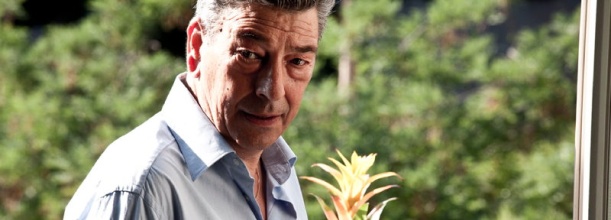Interview! We talk to The Salt of Life star Gianni Di Gregorio

My interview with Gianni Di Gregorio, the writer, director and star of the endlessly charming Italian comedies Mid-August Lunch and The Salt of Life, started about forty minutes late. This wasn’t my fault (I arrived early for once) but Gianni’s – his lunch at a club round the corner overran and he was definitely in no mood to be hurried. By the time he pottered into the office, genial grin and open-collared shirt firmly in place, I was already more or less convinced that I’d wandered into one of his inviting and gently surreal films.
In case you’ve not seen Mid-August Lunch (you could be forgiven for not having seen The Salt of Life as it only comes out today), Di Gregorio plays a faintly fictionalised version of himself who pads about Rome getting into various scrapes as he tries to be a good husband, father, son and occasionally lover whilst never quite managing to sort his own life out. In his new film Gianni is determined to find a girlfriend, a fruitless quest which casts an unusual light on the ageing process whilst being touching and very funny in equal measure.

“Both my films are autobiographical,” Gianni tells me in response to my first nervous question in English (an early attempt at conducting the interview in Italian went rather spectacularly wrong), “but The Salt of Life is the more autobiographical of the two; it reflects the situation that I’m experiencing now. It was also very fast to make – there was quite a lot of mental preparation, but in real terms the film was made over the space of a year. Conversely, Mid-August Lunch was an experience which had occurred over the previous decade and which I’d had time to work on, so it had a much longer gestation process.”
So Gianni’s future wasn’t mapped out at the time of Mid-August Lunch, then. Might he appear a third time? “No, I had no idea what was going to happen to him. I wasn’t intending to make a sequel, but there are obviously common themes between the films – Gianni is still Gianni, his mother (Valeria De Franciscis) is there, his nature is the same. I don’t know what the next film might be – I think there’s a possibility that there are more stories for Gianni, but I’m wary of becoming repetitive. I’m currently contemplating the idea of using another actor as an alter-ego, but I’m not yet sure if that’s a good idea. It’s still at the deliberation stage.”

I observed that Gianni’s various adventures, seen through a variety of lenses in different situations, put me very much in mind of Tati’s great character Monsieur Hulot, a comparison with which Gianni was palpably thrilled. Tati, of course, also directed and wrote the films in which he starred as Hulot, of which only four were ever made (although Sylvain Chomet’s The Illusionist is based on an original Tati script). How was the behind-the-camera experience of making The Salt of Life compared to Gianni’s lo-fi debut Mid-August Lunch? “In practical terms it’s been a lot easier because we’ve had a much bigger budget, which gave us a lot more possibilities, but both films are shot in much the same way – they’re experimental, there’s a mixture of actors and non-actors and lots of freedom to improvise. I wanted to keep that naturalistic style, so The Salt of Life just benefited from greater means and more peace of mind.”
I couldn’t decide whether or not discussing the Italian notion of machismo was a good idea, but Gianni seemed so content rolling his cigarettes (he churned out three or four during the fifteen minutes we were together, twiddling away like an automatic rolling machine with droopy eyelids) that I thought I’d risk it. Perhaps more so in stuffy, restrained Britain than anywhere else, the notion of the hyper-virile, lascivious Italian man is a very persistent archetype – never more so than recently, with Silvio Berlusconi charging around the place like a giant erection with hair plugs. Was The Salt of Life, in which Gianni is determined to find a pliable bit of skirt but is thwarted at every turn, a conscious subversion of the classic image of the Italian male? “When I made the film the Berlusconi scandal hadn’t yet erupted, but it all came to light around the time The Salt of Life was released (in Italy). I was very pleased because I think my film demonstrates a different way of thinking about women and male-female relationships. I’d love to say it was deliberate, but if I’d been thinking of Berlusconi I’d probably not have got anything done!” The bunga-bunga parties were evidently very well-timed from Gianni’s point of view.

Unable to resist ending on a really prosaic note, I asked Gianni who he would most like to be compared to. “You’ve mentioned Tati; someone else recently compared me to Woody Allen. Having my name alongside theirs is already something I could never have imagined.” Both comparisons are well deserved – in fact, I’d go so far as to say that Di Gregorio’s debut film might be the most competent new work by a writer/director/actor since Woody Allen’s late-70s heyday. I left Gianni (by now equipped with enough rollies to build a log cabin for an Action Man) with a cheery “Ciao!” ringing in my ears and a determination to rewatch Mid-August Lunch as soon as possible. If you haven’t seen it, sort yourself out immediately; once you have, I won’t need to tell you to watch The Salt of Life.





Fairly wonderful article. I recently became aware of ones website and also needed to declare that I’ve definitely loved searching your current blog site threads. After all I am registering to your feed i we do hope you produce yet again quickly!